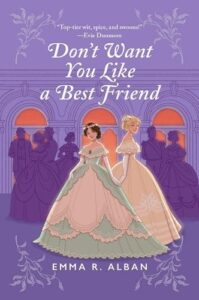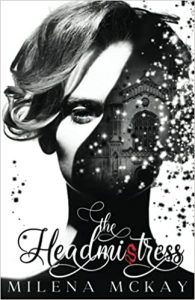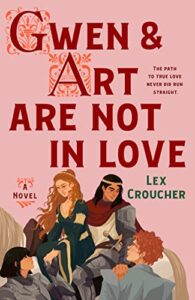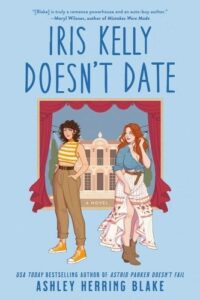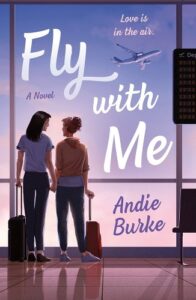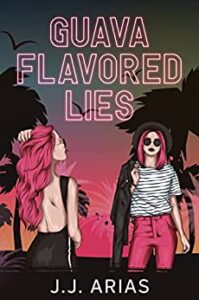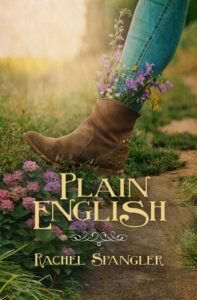Buy this from Bookshop.org to support local bookstores and the Lesbrary!
Pretty much as soon as I discovered Emma R. Alban’s Don’t Want You Like a Best Friend, I was excited to read it. From the frothy cover to the Taylor Swift lyric title (admittedly I don’t actually know Taylor Swift’s music well enough to recognize that on my own, but I generally love the vibe of song lyric titles) to the actual book description, it seemed incredibly up my alley. A hijinks-filled sapphic historic romance? Sign me up! To my absolute delight, the actual contents of the book completely delivered on the promises its outside made.
Don’t Want You Like a Best Friend takes the familiar premise of a reluctant young debutante, Beth, who must find a wealthy husband for the sake of her family and adds a dazzling lesbian, Gwen, with an idea—their parents have clear chemistry and a history, and it would really solve all of their problems if Beth and Gwen set their parents up instead. Over the course of the season, the two come up with a variety of schemes, and as their parents grow closer, so do Beth and Gwen.
I had so much fun reading this book! It was exactly the kind of sweet, banter-and-shenanigans-filled romance I hoped it would be. I read most of the book at work, and it still had me smiling and giggling throughout. I loved both Beth and Gwen, and I believed their romance from the beginning, as well as their friendship. I understood immediately why they liked each other, which I think is particularly important in a friends-to-lovers romance like this. They constantly made each other laugh, as well as myself, but there were also plenty of those delightfully agonizing finger brushes one expects to find in a historical romance.
Beth and Gwen’s relationship was not the only important one in this book, of course. Considering the setup of this book hinges on a parent-trap plot, it’s particularly important to manage the balance between making me care about and believe the parents’ romance as well without them taking the spotlight away from the romance I actually came here for. Admittedly, I was a little worried this book wouldn’t manage it, but I actually thought it did a fantastic job of that. It even made me care about an entirely separate background romance, and the epilogue provided a wonderful preview of the next book’s romance, which I am very much looking forward to. I really loved the characters here.
I will note readers looking for historical accuracy may find themselves frustrated. The language in particular tends a bit more casual than I would have expected. However, I personally did not find myself bothered by it at all. As casual as the language was, the many detailed clothing descriptions and the subplot centered around the social politics of the Matrimonial Causes Act made it clear that this was a deliberate choice. And besides, a strong sense of verisimilitude was not my main concern when I picked up a parent-trap-inspired sapphic romcom with a Taylor Swift lyric in the title. I came here simply to be delighted, and I got more than my money’s worth of that. If that is what you too are looking for, I heartily recommend Emma R. Alban’s Don’t Want You Like a Best Friend.

